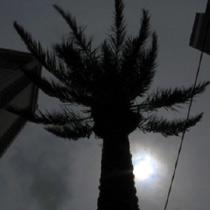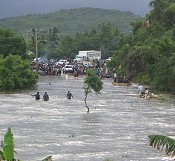VOA慢速英语 2008 1007b
时间:2019-01-11 作者:英语课 分类:VOA慢速英语2008(十)月
This is SCIENCE IN THE NEWS in VOA Special English. I’m Bob Doughty 1.
VOICE TWO:
And I’m Barbara Klein. Our subject today: severe ocean storms.
(MUSIC)
VOICE ONE:
 September is usually the worst month for hurricanes in the Atlantic Ocean. At least ten named storms have formed there this year. The hurricane season continues until the end of November.
September is usually the worst month for hurricanes in the Atlantic Ocean. At least ten named storms have formed there this year. The hurricane season continues until the end of November. The total number of major storms this year has been above average. There were three major hurricanes in the Atlantic Ocean. The latest hurricane to strike land was called Hurricane Ike. It was a huge storm, stretching out across a thousand kilometers when it struck the southern coast of the United States last month.
Hurricane Ike caused major flooding and destroyed thousands of homes. It also left millions of people without power in Texas. The storm killed at least thirty people in nine states.

Flooding in Miragoane, Haiti, after hurricanes Gustav and Ike
The situation was even worse in the nation of Haiti, which has been severely 2 damaged by several storms this year.
VOICE TWO:
About ninety ocean storms form each year around the world. These powerful storms are called hurricanes when they form in the Atlantic Ocean and the eastern Pacific Ocean. They are called typhoons in the northwestern Pacific, and cyclones 3 when they develop in the Indian Ocean. Severe ocean storms in the northern half of the world generally develop in late summer or early autumn near the equator 4.
Storms can result when the air temperature in one area is different from that of another. Warmer air rises and cooler air falls. These movements create a difference in the pressure of the atmosphere. If the pressure changes over a large area, winds start to blow in a huge circle. High-pressure air is pulled toward 5 a low-pressure center.
VOICE ONE:
Severe ocean storms happen less often in the southern hemisphere 6. There, the season of greatest activity is between December and March. South of the equator, the winds flow in the same direction as the hands on a clock. North of the equator, they flow in the opposite direction.
(MUSIC)
VOICE TWO:
Storms can get stronger as they move over warm ocean waters. The strongest, fastest winds of a hurricane are found in the eyewall. This is the area that surrounds the center, or eye, of the storm. The eye itself is calm by comparison 7, with light winds and clear skies.
Wind speeds in severe ocean storms can reach more than two hundred fifty kilometers an hour. Up to fifty centimeters of rain can fall. Some storms have produced more than one hundred fifty centimeters of rain.
These storms also cause high waves and ocean surges 9. A surge 8 is a continuous 10 movement of water that may reach six meters or more. The water strikes low coastal 11 areas. Surges are commonly responsible for about ninety percent of all deaths from ocean storms.
VOICE ONE:
Scientists use computer programs to show where a storm might go. The programs combine information such as temperatures, wind speed, atmospheric 12 pressure and the amount of water in the atmosphere.
Scientists collect the information with satellites, weather balloons and devices 13 floating in the world's oceans. They also collect information from ships and passenger flights and from airplanes that fly in and around storms. The crews drop instruments on parachutes to record temperature, pressure, wind speed and other conditions.
VOICE TWO:
The Saffir-Simpson Hurricane Scale is a way to rate storms based on wind speed. It provides an idea of the amount of coastal flooding and property damage that might be expected.
The scale is divided into five groups. A category one storm has winds of about one hundred twenty to one hundred fifty kilometers an hour. It can damage trees and lightweight structures. It can also cause flooding.
Wind speeds in a category two hurricane can reach close to one hundred eighty kilometers an hour. These storms are often powerful enough to break windows or blow a protective 14 covering off a house. Winds between about one hundred eighty and two hundred fifty kilometers an hour represent categories three and four. Anything even more powerful is a category five hurricane.
(MUSIC)
VOICE ONE:
The major hurricanes that formed in the Atlantic Ocean this year were called Gustav, Hanna and Ike. How did they get these names?
An Australian scientist began to call storms by women's names before the end of the nineteenth century. During World War Two, scientists called storms by the names of their wives or girlfriends.
The weather service in the United States started to use women’s names for storms in nineteen fifty-three. In nineteen seventy-nine, it began to use men’s names, too. Scientists decide on lists of names years in advance. They agree on them at meetings of the World Meteorological Organization.
VOICE TWO:
Naming storms is part of the job of the National Hurricane Center in Florida. Storms get a name when they reach a wind speed of sixty-two kilometers an hour, even if they never develop into hurricanes. The first name used in a storm season begins with the letter A, the second with B and so on. The same list of names is not used again for at least six years. And different lists are used for different parts of the world.
VOICE ONE:
Three years ago, Greek letters had to be used for the first time to name storms in the Atlantic. That was the plan -- to call storms Alpha, Beta and so on -- if there were ever more than twenty-one named storms in a season. In fact, there were twenty-eight. The two thousand five Atlantic hurricane season was the first on record with fifteen hurricanes. Four hurricanes reached category five strength -- also a first.
The National Oceanic and Atmospheric Administration 15 says it was the first season with four major hurricanes to strike the United States. The most destructive 16 was Katrina. More than one thousand eight hundred people were killed along the Gulf 17 of Mexico coast.
(MUSIC)
VOICE TWO:
Debate continues about the effect of rising temperatures in Earth's atmosphere on hurricanes. A new report says ocean storms are growing in strength and climate might be to blame. Scientists from Florida State University and the University of Wisconsin reported their findings 18 last month in Nature magazine.
The scientists say the most powerful ocean storms are becoming more intense 19. They found that the strongest hurricanes and typhoons have become even stronger over the past twenty-five years.
The lead writer of the report was James Elsner of Florida State University. He says there is a good chance of more category four and five hurricanes in the future because ocean temperatures are expected to continue rising.
VOICE ONE:
The scientists studied weather satellite information from nineteen eighty-one through two thousand six. During the period, ocean surface temperatures increased by an average of a third of a degree Celsius 20.
The scientists found that this change has fueled the increase in hurricane intensity 21. They also found that the highest wind speeds of the strongest storms averaged two hundred fifty-three kilometers an hour in two thousand six. This is an increase from two hundred twenty-five kilometers an hour in nineteen eighty-one. The increases in intensity were greatest in the Atlantic Ocean.
VOICE TWO:
Last year, other scientists found that the number of Atlantic hurricanes increased one hundred percent over the past century. Greg Holland and Peter Webster studied records of major storms in the North Atlantic.
Mister 22 Holland works 23 for the National Center for Atmospheric Research. He says the study provided 24 strong evidence that climate change is a major influence on the increasing number of Atlantic hurricanes.
VOICE ONE:
However, not everyone agrees that climate change is causing more severe ocean storms. Jeffrey Halverson is a hurricane expert at the University of Maryland. He says there is probably a link to climate change but it has been difficult to find.
Christopher Landsea is with the National Hurricane Center. He says he believes climate change has a small influence on hurricanes. He argues that stronger storms are the result of changes in climate and natural weather cycles. But other experts say wind speeds will increase in the strongest storms for the next several years.
(MUSIC)
VOICE TWO:
This SCIENCE IN THE NEWS was written by Shelley Gollust. Our producer was Brianna Blake. I'm Barbara Klein.
VOICE ONE:
And I’m Bob Doughty. Listen again next week for more news about science in Special English on the Voice of America.
- Most of successful men have the characteristics of contumacy and doughty.绝大多数成功人士都有共同的特质:脾气倔强,性格刚强。
- The doughty old man battled his illness with fierce determination.坚强的老人用巨大毅力与疾病作斗争。
- He was severely criticized and removed from his post.他受到了严厉的批评并且被撤了职。
- He is severely put down for his careless work.他因工作上的粗心大意而受到了严厉的批评。
- The pricipal objective in designing cyclones is to create a vortex. 设计旋风除尘器的主要目的在于造成涡旋运动。 来自辞典例句
- Middle-latitude cyclones originate at the popar front. 中纬度地区的气旋发源于极锋。 来自辞典例句
- Singapore is near the equator.新加坡位于赤道附近。
- The United States is north of the equator.美国位于赤道以北。
- Suddenly I saw a tall figure approaching toward the policeman.突然间我看到一个高大的身影朝警察靠近。
- Upon seeing her,I smiled and ran toward her. 看到她我笑了,并跑了过去。
- This animal is to be found only in the Southern Hemisphere.这种动物只有在南半球才能找到。
- In most people,the left hemisphere is bigger than the right.多数人的左脑比右脑大。
- They make a comparison of New York to a beehive.他们把纽约比作一个蜂巢。
- This dress is really cheaper by comparison.比较起来,这件衣服确实便宜。
- The surge travelled southwards along the coast.浪涛沿着海岸向南涌去。
- It failed to stimulate a surge of investment in industry.这没有能刺激工业投资的激增。
- The Yellow River surges onward like ten thousand horses galloping. 黄河以万马奔腾之势滚滚向前。 来自《现代汉英综合大词典》
- The raging tide of revolution surges forward. 革命怒潮汹涌澎湃。 来自《现代汉英综合大词典》
- She finally got in after 10 years'continuous effort.坚持不懈地努力了十年后,她终于当选了。
- We must be continuous to study.我们必须不断学习。
- The ocean waves are slowly eating away the coastal rocks.大海的波浪慢慢地侵蚀着岸边的岩石。
- This country will fortify the coastal areas.该国将加强沿海地区的防御。
- Sea surface temperatures and atmospheric circulation are strongly coupled.海洋表面温度与大气环流是密切相关的。
- Clouds return radiant energy to the surface primarily via the atmospheric window.云主要通过大气窗区向地表辐射能量。
- electrical labour-saving devices around the home 节省劳力的各种家用电器
- modern labour-saving devices such as washing machines and dishwashers 诸如洗衣机和洗碗机之类的现代化省力设备
- A mother naturally feels protective towards her children.做母亲的天生要保护自己的孩子。
- We feel safe with a protective device in the house.我们因为家里有了防护装置而感到安全。
- Who is in charge of the administration of your company?你们公司的行政工作由谁负责?
- The teachers are responsible to the school administration.教师向学校行政负责。
- In the end,it will be destructive of our whole society.它最终会毁灭我们整个社会。
- It is the most destructive storm in 20 years.这是20年来破坏性最大的一次风暴。
- The gulf between the two leaders cannot be bridged.两位领导人之间的鸿沟难以跨越。
- There is a gulf between the two cities.这两座城市间有个海湾。
- It behoves us to study these findings carefully. 我们理应认真研究这些发现。
- Their findings have been widely disseminated . 他们的研究成果已经广为传播。
- Susan was an intense young lady.苏珊是一个热情的年轻姑娘。
- The quarrel caused her intense unhappiness.争吵令她极其不快。
- The temperature tonight will fall to seven degrees Celsius.今晚气温将下降到七摄氏度。
- The maximum temperature in July may be 36 degrees Celsius.七月份最高温度可能达到36摄氏度。
- I didn't realize the intensity of people's feelings on this issue.我没有意识到这一问题能引起群情激奋。
- The strike is growing in intensity.罢工日益加剧。
- Mister Smith is my good friend.史密斯先生是我的好朋友。
- He styled himself " Mister Clean ".他自称是“清廉先生”。
- We expect writers to produce more and better works.我们期望作家们写出更多更好的作品。
- The novel is regarded as one of the classic works.这篇小说被公认为是最优秀的作品之一。